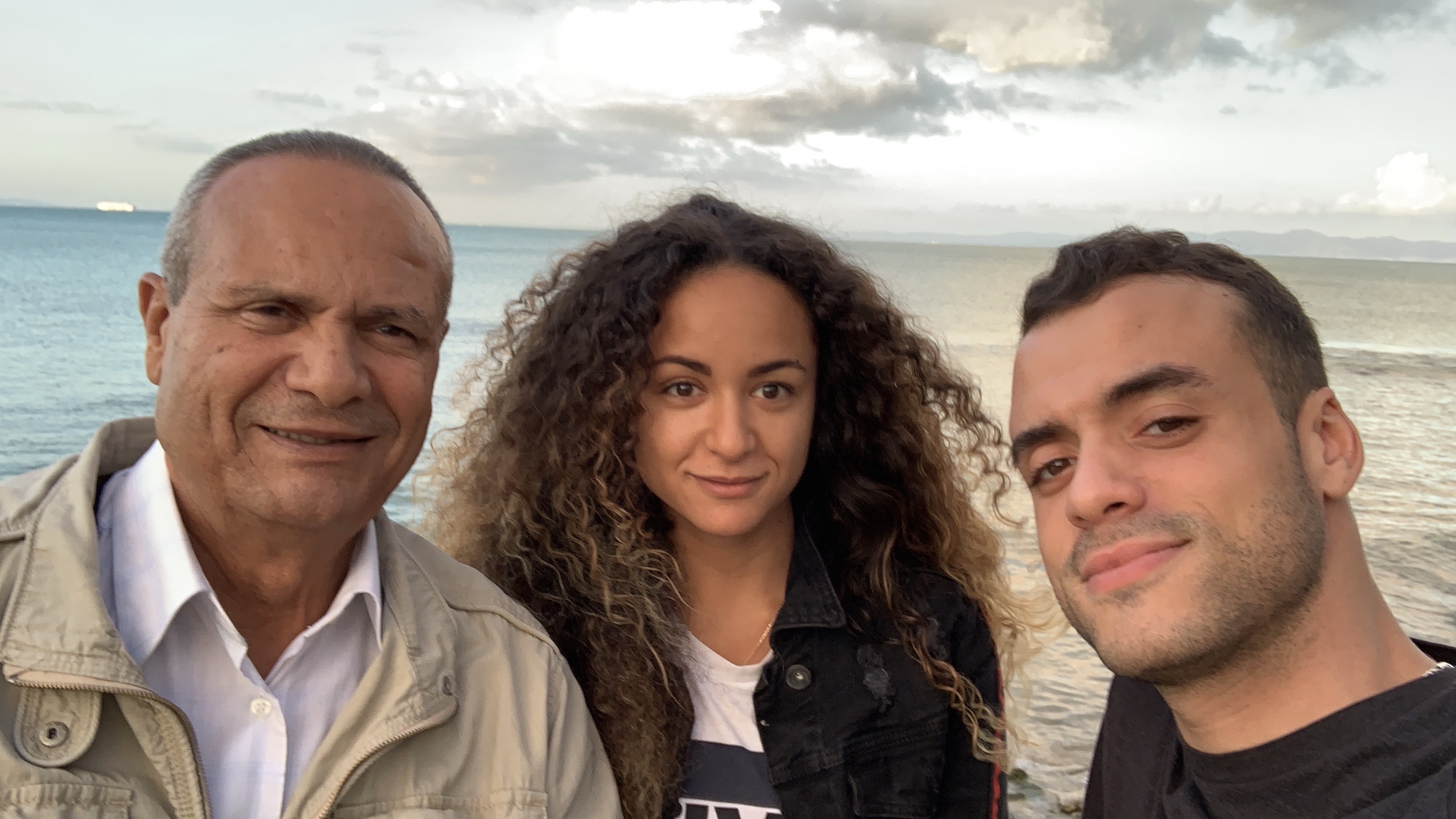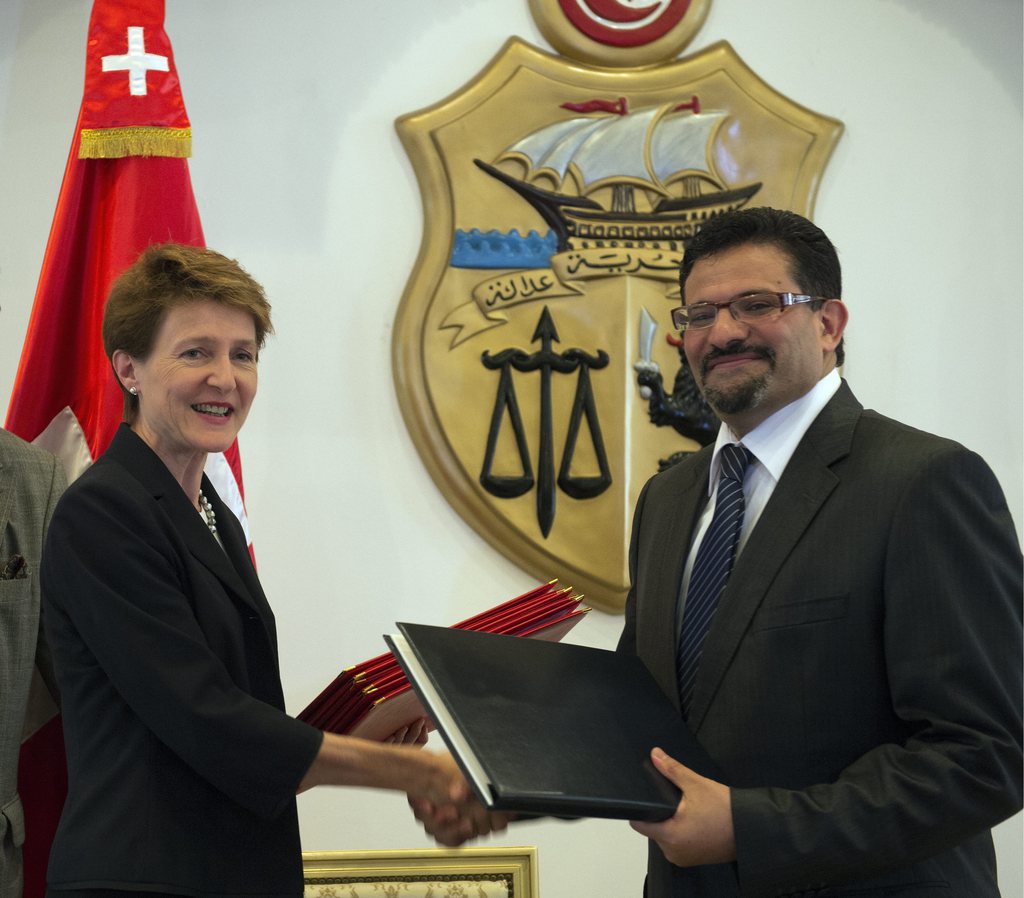
Relatives fear for 81-year-old Swiss detained in Tunisia

A former United Nations employee has been held in custody for more than a year. His family is convinced he is an innocent victim of political circumstances and accuses the Swiss authorities and the UN refugee agency of not doing enough.
“He is an innocent citizen, an innocent Swiss citizen. He is risking death, and this is unacceptable,” says Yusra Djemali, her voice trembling as she speaks of her father Mustapha, an 81-year-old chronically ill Swiss-Tunisian detained in Tunisia. She accuses Swiss authorities of failing to act, using his dual citizenship as justification for their inaction.
Since he was first detained in May 2024, longtime UN employee Mustapha Djemali has lost 40 kg in body weight, his family reports. They describe the prison conditions as appalling. Sixty inmates are crammed into an overcrowded prison cell with tiny windows, no air conditioning despite outside temperatures sometimes reaching more than 40 degrees Celsius, and the air thick with cigarette smoke.
It took months for the Tunisian authorities to release Djemali’s reading glasses for repair, and he only received all his essential medication after more than a year in prison. Several requests to release him on humanitarian grounds due to his age and fragile health, and place him under house arrest instead, were rejected by the relevant court.
Rough winds blow in Tunis
Djemali is one of eight employees from several Tunisian non-governmental organisations (NGOs) who were detained since spring 2024. The helpers had been supporting refugees, asylum seekers and migrants. The Tunisian prosecutor’s office accuses them of promoting the irregular settlement of foreigners in Tunisia. The trial appears to have been triggered by Djemali’s NGO publishing a tender to rent hotels for accommodating refugees.
For more than two years, the Tunisian government has been cracking down on migrants and refugees from sub-Saharan African countries. It all started after President Kais Saied warned of a “large-scale, organised population exchange”.
But official figures show that only around 66,000 foreigners live among Tunisia’s twelve million inhabitants. After signing a migration deal with the European Union in summer 2023, arrivals from Tunisia dropped significantly in Europe. Yet allegations of serious human rights violations against migrants and refugees in Tunisia are on the rise.
In 2017, long after his retirement, Djemali founded the Tunisian Refugee Council (Conseil Tunisien pour les Réfugiés, CTR), an NGO which is almost entirely funded by the UN refugee agency UNHCR, his former employer. From 2019, Djemali’s NGO handled the registration of refugees seeking asylum in Tunisia on behalf of UNHCR. This is done through the UN agency because Tunisia has no national asylum law and therefore no official procedure for refugees.

The UN had almost pushed Djemali to set up his organisation for this purpose, says son Fadhel. “They needed our father. Since he had worked for UNHCR for many years, they proposed this project to him – just as it’s done all over the world – having a partner to take over logistics and administration.”
‘As if he weren’t 100% Swiss’
In 1980 Djemali came to Geneva and started his career with UNHCR. He worked for the UN refugee agency until 2004, most recently as regional director for North Africa and the Middle East. During this time, his four children were born. They grew up in Switzerland and feel at home there, just like his wife does who now works as a civil servant in Switzerland.
All family members have held Swiss citizenship for more than 20 years.
However, they are also Tunisian. You cannot give up or lose Tunisian citizenship, even if you acquire another nationality. This has made Djemali’s case more complicated as under international law, he is regarded Tunisian when in Tunisia. The Swiss authorities therefore have only limited room to intervene, at least officially. “The argument of dual citizenship was the first thing I heard. It keeps on being mentioned,” says Djemali’s son Fadhel. “As if he weren’t 100% Swiss.”

Beyond the legal limit for pre-trial detention
Fadhel Djemali was present when his father was arrested at the CTR office on the morning of May 3, 2024. Two hours later, the father was due to meet a Tunisian ministry official and a UNHCR representative. At the time, father and son were convinced that it was a misunderstanding and that he would soon be released. The Swiss embassy, which he contacted immediately, was of a similar opinion. His father, he says, was always discrete, never appeared in public or spoke out on political issues. The work of the Refugee Council was highly technical, administrative and known to the authorities. He had never worked with irregular migrants, the family stresses, but only with recognised refugees and asylum seekers following international procedures.
But nothing happened. By the beginning of July 2025, the 14-month legal limit for pre-trial detention had passed, and Djemali was still in prison. A new trial date has not been set yet. The Swiss Foreign Ministry (FDFA) told Swissinfo that it was “closely following developments in the case” and added that “the Swiss embassy in Tunisia and the FDFA headquarters in Bern (…) had advocated for Djemali at the highest level with the Tunisian authorities”. For reasons of data protection and personal privacy, the FDFA said that it could not answer specific questions about the case.

More
Is the Swiss-Tunisian migration partnership truly a ‘win-win’ relationship?
Similarly, the FDFA does not specifically address the allegations made by Djemali’s family which Swissinfo conveyed to them. In response to a question from a parliamentarian, the government clarified in early June that the case had been discussed “between [the Swiss Foreign Minister] Ignazio Cassis and his Tunisian counterpart.”
While national and international human rights organisations have advocated for Djemali, the family complains about the lack of engagement by the Swiss authorities and UNHCR. According to the family, Swiss embassy representatives have only visited Djemali twice in prison, the last time in November. “They don’t take this seriously enough. We feel that they are just waiting until it’s over,” says daughter Yusra.
Allegations against authorities
After relying for a long time on the quiet diplomacy of the Swiss authorities behind the scenes, Djemali’s relatives went public this year. “We are not asking the Swiss government to openly attack the Tunisian government. But the investigations have not found anything, the finances are in order, and the file is empty. There is no charge, and the period of the pre-trial detention is over. They must ask why their citizen is still in prison,” says Fadhel Djemali. He says the only way to make progress now is through direct negotiations between Swiss President Karin Keller-Sutter and Tunisia’s President Kais Saied.

The family’s anger is not directed only at the Swiss authorities, they are also frustrated by what they see as UNHCR’s lack of engagement. Fadhel Djemali is convinced that the agency could have quickly resolved the case from the start. When Swissinfo conveyed the family’s frustration and allegations to UNHCR representatives at its Geneva headquarters, the agency responded cautiously emphasising “that it continues to closely monitor Mr Djemali’s case and stays in contact with his family at the highest level. UNHCR remains committed to playing a constructive role in seeking a positive solution to Mr Djemali’s situation,” a UNHCR spokesperson told Swissinfo.
“This is scandalous,” fumes Fadhel Djemali stressing that he had never received any information from UNHCR about its involvement. Unlike the Office of the High Commissioner for Human Rights (OHCHR), the refugee agency has never contacted the family. Yet UNHCR, in his view, bears the main responsibility since it initiated and funded the project in question. “They were only spared because they have diplomatic status,” he says. And now his father is paying the price.
Edited by Benjamin von Wyl. Adapted from German by Billi Bierling/ds

More
Our newsletter on geopolitics

In compliance with the JTI standards
More: SWI swissinfo.ch certified by the Journalism Trust Initiative





























You can find an overview of ongoing debates with our journalists here . Please join us!
If you want to start a conversation about a topic raised in this article or want to report factual errors, email us at english@swissinfo.ch.